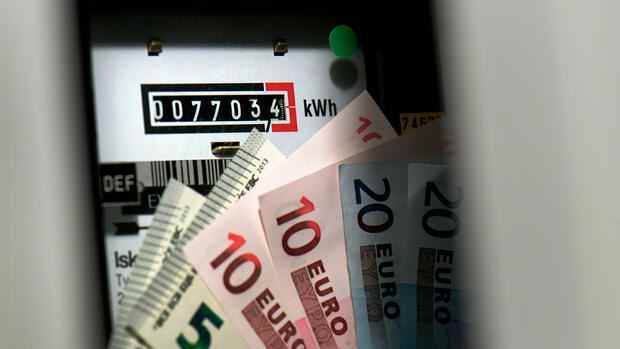Price shock for electricity and gas customers.
(Photo: dpa)
Dusseldorf Anyone who receives an email from their energy supplier these days should take a closer look. The chances are good that your own electricity and gas supplier will announce a price increase that is tough.
According to the comparison portal Verivox, more than 280 electricity and 515 gas providers have done this for January and February so far. Winter is here and Germany’s consumers are now getting the receipt for the energy price crisis that has been going on for months.
Customers who receive letters like this should react particularly quickly: “As of November 27, 2021, your working price will change from 4.39 cents per kilowatt hour to 17.40 cents per kilowatt hour”, the Düsseldorf-based provider Wunderwerk informed its customers a few weeks ago Write with. Neither the Wunderwerk brand nor the parent company Elektrizitätswerke Düsseldorf AG responded to inquiries from the Handelsblatt.
What many do not know: Customers who are affected by such extreme price increases actually have a special right of termination. “However, many let that slip by,” says energy expert Udo Sieverding from the consumer center in North Rhine-Westphalia to the Handelsblatt.
Top jobs of the day
Find the best jobs now and
be notified by email.
In principle, due to the “exceptional situation” on the electricity and gas market, a change of provider is not always worthwhile during these times. Sieverding advises customers who have not yet received a price increase to stick to their tariff.
Otherwise, the usually more expensive municipal utilities actually have the cheapest tariff in some cities during these times. The consumer advocate therefore recommends looking for cheaper providers outside of Verivox, Check24 and Co. “because comparison portals often do not include the basic service tariffs in their search results”. It is also worth paying attention to short contract periods so that you can switch more quickly in case of doubt. One thing is clear, however: it will be expensive.
Low-wage earners in particular get into problematic situations
“Consumers must expect a wave of price increases this winter,” says Steffen Suttner, Managing Director Energy at Check24 the Handelsblatt. “This is not least due to the increasing CO2 tax, on the other hand, the suppliers pass on increased purchasing costs to their customers.”
According to Check24, the price increases that the basic electricity suppliers have announced so far are on average just under 40 percent. For a model household with a consumption of 5000 kilowatt hours (kWh), this means additional costs of an average of 649 euros per year.
For gas, the price increases averaged 34.5 percent, according to Check24. For a model household with a consumption of 20,000 kWh, this means additional costs of an average of 518 euros per year.
Since the beginning of the year, the price of electricity on the exchange has roughly quadrupled from just under 59 euros per megawatt hour to around 240 euros. The gas price has also multiplied in the meantime. If you have oil heating in the basement, it doesn’t have an easier time either. The price of a barrel of North Sea Brent has risen by almost 75 percent since January.
Rising energy prices are increasingly becoming a question of existence for low-wage earners. This is shown by an analysis of the specialized energy debt advice of the consumer centers in Berlin, North Rhine-Westphalia and Rhineland-Palatinate.
For most German utilities, however, the energy price crisis is unlikely to immediately lead to existential risks. There have already been a number of bankruptcies as a result of the rally – Otima Energie AG, Smiling Green Energy and Lition Energie from Berlin are only the latest from a series of bankruptcies in the electricity sector.
Companies such as Eon, municipal utilities and others usually secure themselves through long-term supply contracts at fixed prices – even one to two years in advance. However, this does not apply to business with new customers. The gap between the asking prices with which new contracts are advertised and the record costs at which the additional natural gas or electricity must be purchased in the current wholesale business is simply too big to make a profit. As a result, prices rise.
More: Investors benefit from rising oil and gas prices



